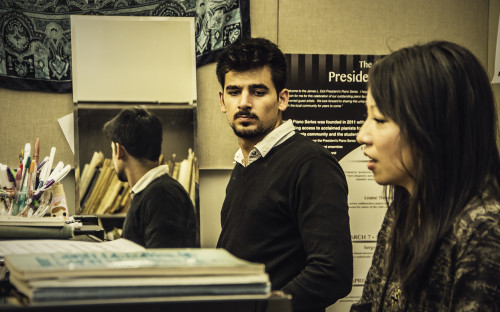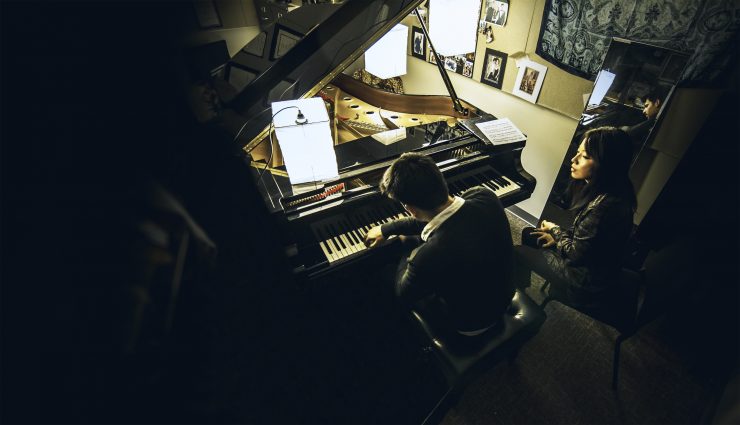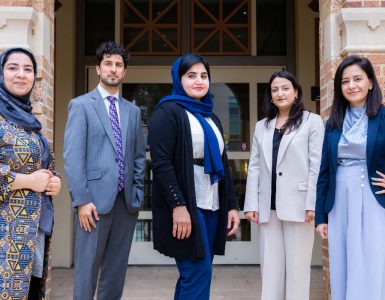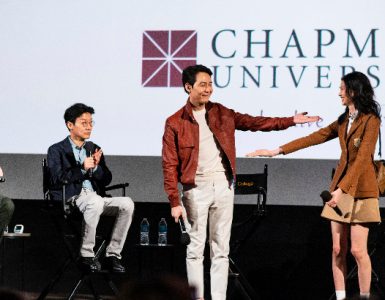This story appeared in the spring 2014 issue of Chapman Magazine.
As professor and pianist, Dr. Fong strikes a sustaining balance that resonates with students and audiences alike.
In the video below, go “Beyond the Notes” as
Grace Fong
discusses the creative and intellectual process that leads a performer from the notes on the score to the actual performance. She uses examples from recordings, scores and demonstrations at the piano.
Grace Fong jokes that she can trace her musical growth back to her pre-natal period. After all, she was in the womb as her mother played her college graduate recital.
“I think I came out listening to music,” said the prize-winning concert pianist who has a doctorate in musical performance and directs the keyboard studies program at Chapman University. “I don’t remember a life without music, and I can’t imagine my life without it.” As a teacher, Fong was also an early convert. In her toddler years, she would take naps under the piano while her mother gave lessons, then later she would sometimes sub for her mom, “and over the years I absolutely fell in love with teaching.”
These days, it’s not always easy to maintain the balance between an international career and working with piano students at Chapman. Typically, she schedules concerts on weekends, during interterm or summer tours “so I can consistently be available to my students during the year.” Fong draws on the lessons of her mentor, Sergei Babayan, with whom she studied at the Cleveland Institute of Music, but she also charts her own classical path. We asked her to talk more about how performance and professorship co-exist in her musical life.
Q: What’s the best thing about your life as a performer? How about as a teacher?
I love both facets of this ‘work,’ whether it be playing or teaching. They are different aspects of the same thing – one is just expressed in a non-verbal medium, but both involve communicating ideas and concepts tactilely, viscerally, emotionally, and spiritually. I started playing before I could talk, so music is really my first language. As a performer, I’m not the star—the music is the star, and I am the vessel through which the music passes, through a prism to the listener and to my students.
As for balancing teaching and performing, I pack most of my concerts during the interterm and summer months. If I do have to be away for a concert during the school year, I can easily work with my students from across the world on Skype.
Every day as a performer is a good day. It’s unbelievable to call this “work,” because I cannot imagine a more emotionally and spiritually rewarding activity. To travel around the world and share this universal language is a great privilege. Of course, performers have “off” days – sick days, excess nerves, or days with physical or mental battles. We work long hours to be able to share what we want to say through our music, so I’m most happy when I feel the freedom on stage to “speak” to the audience through my music. When I feel that I have delivered the composer’s intent, (with a twist of Grace, of course), I feel a transcendent energy in the room, and I feel that I’ve done what I was supposed to do. There are no better words to hear than when people tell me that in the two hours during the performance, they healed, went to another place, and forgot the trivialities of their daily life. It makes me feel like a magician.
Unlike many other areas on campus, most of my teaching is one-on-one. In the arts, each individual’s journey is so different. I feel so lucky to have the opportunity in the students’ four years to help them find their individual “voice.” Where will each voice take them in ten, twenty, or thirty years? Ten students can approach one piece of music completely differently: physically, musically, philosophically – every artist has a different story to tell – one just needs to know how to tell it and to have the confidence to tell it. It’s exciting to hear what each student has to offer. I encourage my students to appreciate the differences that make them individual artists, and not to just regurgitate what they hear on Youtube. It’s a fantastic resource to have, and we can access more music than ever; however, it’s easy to lose one’s individual voice along the way. When the students find their voice, are fanatically involved in the musical process, hungry for more and no longer dependent on my approval, it doesn’t get much more rewarding than that!
Q: What do you seek to contribute to help students take the next steps in their careers?
Students come to Chapman knowing that they love the piano and music. How serious are they about doing this for the rest of their lives? Not everyone is made to be a concert pianist or recording artist, and we figure that out together. Maybe they’re better suited in education, collaborative arts, or arts management. It’s important that students know what they are up against in this competitive field where millions of people want to be a musician and entertainer. I encourage my students to participate in competitions, attend festivals, go to concerts, get a glimpse of what’s out there, and it all shapes their decisions about their path. We’re lucky that students get this glimpse when artists come to us on campus as we go into the 3rd season of the prestigious James L. Doti President’s Piano Series in the ‘14-15 season.
Once upon a time it was enough to be an excellent pianist. Boy has the music world changed! There are more jaw-dropping pianists than ever before, so how does one even begin to compete in this field today? I’ve created a new seminar beginning fall 2014 to address this very question, called “The Business of Piano,” in which we will look at those important topics rarely discussed. Some topics for this seminar include getting & working with agents, marketing & self-promotion, stage presence & injury-prevention, how-to: interviews, radio broadcasts, what are your options as a pianist, your rights and responsibilities as a musician, putting together your pianist’s portfolio, making recordings, preparing for Graduate School, concerts and festivals, who are legends and current giants of piano, and speaking to your audience.
We teachers have the responsibility of keeping up with major trends and issues, serving as models for future teachers, advocating for our profession and creating future audiences. I’d like to turn out not only wonderful pianists, but also well-informed members of the arts community.
More and more I see that talent is prevalent, but work ethic is harder to come by. In a digital world where things are seemingly becoming easier and faster at the blink of an eye, the endless and strenuous work of the creative musician stays constant. There’s no “easy way out” here. An intelligent work ethic combined with a fanatic obsession with music is essential to surviving in this cutthroat field.
As a teacher, I can only give as much as the student wants to give in return. I set the bar high for my students, and it’s draining when a student doesn’t return the energy – but when the student is prepared and passionate, the synergy is staggering. I think both student and teacher must inspire one another. The growth is mutually rewarding! I stress the importance of work ethic, humility, and positive attitude in this business. There’s the saying, We are what we eat. Well, I think we play who we are, and if that’s ugly, then I don’t want to hear it!
Q: How do you help students move beyond technical proficiency to add depth to their performances?

I often hear: “I played quite well in the practice room—but what happened on stage?” Over the years, I realized that there’s a slight disconnect between practice in the practice room and ultimately a performance on stage. On the stage, we try to be as communicative and expressive as possible, and that involves changes in breathing, some degree of tension, anticipation or excitement as one’s heart rate speeds up in front of a large group of people—none of which happen in the practice room. I’ve learned that one needs to recreate the performance intensity in the practice room so that there is never a note played on autopilot. Each note must say something and invoke the same sense of excitement and delivery.
We attend a concert to take away something shared, something communicated. We don’t pay a ticket to hear someone just play fast – we could very well put on an accelerated midi file on a computer. One of the most important messages I can get across to my students is that there must absolutely be emotional content behind every single note played. The music was written by a human, intentionally, so there is emotion, response, reaction behind each note. I insist that the students hear what they want to play before they play it; otherwise, their finger movement is just an accident. We must be aware of how we use the instrument so that the listener hears what we intend. How is it received emotionally, spiritually? I try to use other senses to help bring the music alive for the students, such as to describe “seeing and feeling the first ray of sunshine appear amidst the gloom of the storm” or to “taste each chord.” When I see this all finally click with a student, I know they’ve progressed.
This relates to the issue of practicing. I don’t like to put a number on how much to practice, as it depends on each person’s different abilities. Whatever that is, the practicing should be qualitative versus quantitative. One person can get the same work done in a focused, efficient half hour that another person will do in 10 hours of mindless practicing. It’s usually the case that if one can’t improve in a couple hours, then there’s something in the practice method that is not right. I tell my students to not practice what they’re good at, but to practice what they don’t do well and they should be sure to get somewhere. Time is of the essence, and we’re not machines either—we have to consider how much we can take physically. We need to leave some extra time in the day to live life!
Q: How does teaching influence you as a pianist, and how does performing inspire you to teach?
As a performer, I take a piece of music, via unflinching self-evaluation, from the first to last note to an organic outcome. I then bring that knowledge and inspiration – whether it be a lesson about the music itself, performance anxiety, listening from a critic’s point of view, etc. – to a student who is open and like a sponge. The way the student then takes the information and makes it work for him or herself teaches me something as well – they remind me to keep a fresh approach in the way I tackle a piece of music. I learn something in that process and come back out of it with renewed pleasure in music making.
The main job of a teacher is not to teach how loud or soft, fast or slow something should go, but how to discover what to look for in order to make decisions. In music, there isn’t one answer, and it’s great to be able to suggest possibilities. Many of my lessons involve demonstration, not because I want students to imitate me, but because so much of music is unspoken and understood in that magical experience that’s so much more precise than words. I like to challenge them to do something different from what I demonstrated.
Q: As someone who is accomplished but still a young artist herself, what remains on your performance bucket list?
I typically have some kind of jazz on my playlist anytime I’m not teaching or at the piano myself. I wish I could improvise like Hiromi Uehara. What she does comes from a completely different part of the brain than what I do! There’s a video of Hiromi and Chick Corea doing the most jaw-dropping jam session. They completely lose themselves, making it all up as they go along—will I be able to do that in this lifetime?





Add comment